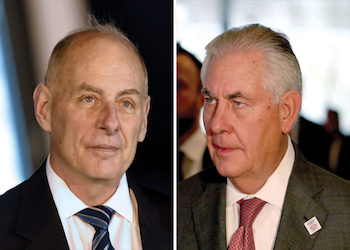The US Secretaries of State and Homeland Security visited Mexico in what appears to be an attempt to ease tensions between the two countries, but statements contradicting earlier US presidential comments do not bode well for future security cooperation.
During a press conference on February 23, the head of the US Department of Homeland Security John Kelly blatantly contradicted his president’s comments on the militarization of US deportations during a diplomatic visit to Mexico, reported the New York Times.
Earlier this week, President Donald Trump had boasted that the increased deportation of undocumented migrants under a new hardline policy amounted to “a military operation.” But alongside US Secretary of State Rex Tillerson during the visit, Kelly said that the US military would not be involved and that there would be no mass deportation.
Kelly also insisted that the policy would be implemented humanely and within the boundaries of US laws. A joint statement by the two US secretaries on February 23 stressed the importance of maintaining close cooperation between Mexico and the United States.
The secretaries’ visit and comments clearly appear to be an attempt to salvage diplomatic relations between the two countries. These have taken another blow under the Trump administration this week, due not only to the aforementioned presidential directive that advocated for increased deportation back to Mexico — including of non-Mexican undocumented migrants — but also because of President Trump’s request for an assessment by February 24 of the foreign aid the United States provides to Mexico.
According to the New York Times, the strong implication behind this request is that the new administration may intend to leverage Mexico into paying for the infamous border wall by withholding aid.
Mexico’s Foreign Minister Luis Videgaray responded to these new developments by expressing his concern for the future of bilateral cooperation, reported the BBC. But according to La Jornada, the Mexican top official adopted much tougher rhetoric in private with Mexican congressional representatives, warning that the country was prepared to engage in an economic war with the United States in response to harmful policies.
InSight Crime Analysis
The contradictory signals emanating from the White House reflect a lack of clarity within the Trump administration about its policies toward Mexico. While the president himself continues to make public remarks that inflame long-simmering tensions between the two nations, key members of his cabinet like Secretary Kelly appear to be attempting to reassure counterparts in Mexico that the United States is still willing to cooperate on issues such as security.
However, it is unclear whether these damage control efforts will be sufficient to mend the damage caused by Trump’s controversial pronouncements. Anti-Trump sentiment among the Mexican public has been growing ever since the real estate mogul began his presidential campaign by describing Mexican immigrants in the United States as “rapists” and criminals. This dynamic may make it difficult for political leaders to cooperate with the new president’s administration.
SEE ALSO: Mexico News and Profile
Indeed, the implication by Videgaray that his country’s government is willing to forcefully resist unpopular US policies toward Mexico raises concerns about cooperation on important security issues. In a context of deteriorating bilateral relations, it is possible that Mexico may cut down on intelligence sharing or reduce efforts to stem migration and smuggling. And short of these steps, the simple fact of latent distrust between Mexico and the United States could impede day-to-day work on shared efforts to combat organized crime groups that operate on both sides of the border.
A glimmer of hope for the future of this cooperation may reside in Secretary Kelly. As InSight Crime previously explained, the US Secretary of Homeland Security gained a nuanced understanding of security issues in Latin America during his tenure as head of the US Southern Command. The former general, for example, has acknowledged the need to address violence and development in order to undercut the power of criminal groups.
The question is whether Kelly can convince the president to cut back on his divisive rhetoric in order to preserve a relationship that is crucial to security developments in Mexico, the United States and the region as a whole.

